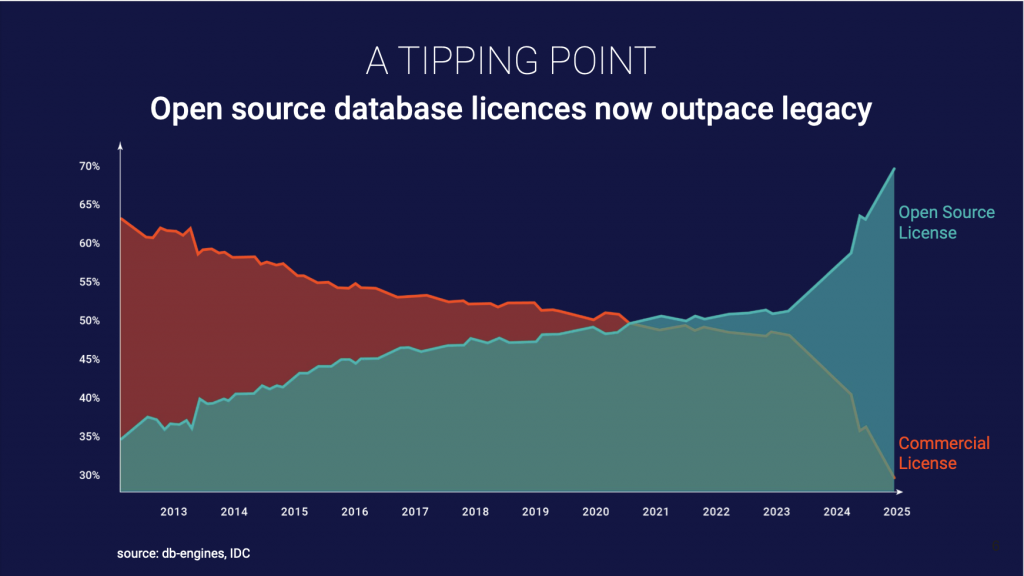As the DBMS landscape experiences seismic changes right beneath our feet, innovators and market leaders across industries are taking notice.
Are you?
As of 2021, open source database licenses outpace commercial database licenses and this trend shows no signs of slowing. According to Red Hat’s The State of Enterprise Open Source report, 80% of IT leaders expect to increase their use of enterprise open source software for emerging technologies. Should this attitude continue to impact how businesses build their IT infrastructure, open source databases like Postgres could definitively dominate their legacy proprietary counterparts by 2025.

You may be asking:
- What led to this incredible market sea change?
- Does it really matter to my organization?
- If so, how do I take advantage of it?
These essential questions are why EDB was excited to host our latest “Ask the Expert” webinar, entitled “How Database Transformation Accelerates Your Business Journey.” During the session, EDB’s EMEA Director, Sales Engineer Kevin Li spoke with EDB EMEA GM and Vice President Hervé Timsit about:
- The rise in popularity of open source database solutions
- How Postgres has led the charge
- What this means for digital transformation efforts
- Why market leaders and up-and-comers alike should care
In this blog, we’re excited to share some of the highlights of this session. We encourage you—whether unable to attend the live webinar or simply looking to revisit critical insights—to check out the on-demand recording and full slide deck EDB has provided on our website.
Freedom and control: the makings of a modern database
Nowadays, every enterprise’s most valuable asset is its data. Data governs how you evolve and improve your applications, how you interact with your customers and how you navigate your market. As such, having complete ownership of your data—the freedom to leverage it as you see fit—is not just an economic advantage, but a business imperative.
In recent years, it’s become increasingly clear that most commercial database providers refuse to offer that freedom. With vendor lock-in, perpetually rising prices and inflexible licensing agreements that limit what tools and architectures customers can take advantage of, these proprietary DBMS’s are holding your data and applications hostage.
Restricted in how they can build and support their most mission-critical assets, companies of all sizes have made the decision to abandon legacy providers like Oracle in favor of open source DBMS alternatives that will allow them to innovate, transform and grow on their own terms.
Among these, Postgres has established itself as the most loved, wanted and used database with developers.
Staying competitive in a brave new database world
In recent years, Postgres has cemented its reputation as both a database-of-choice and a market disruptor. Because of its rapid growth, seemingly endless extensibility and massive developer community, it has proven to be the perfect DBMS to meet the modern moment—and to help organizations stay competitive in an era of lightning-fast evolution.
This is the era of modern enterprise applications, designed for:
- Highly transactional DBMS with growing user bases
- Economic efficiency
- Air-tight security
- Fast-paced release/update schedules
- Developer-centric design
- The ability to run anywhere and everywhere
In order to both build market share and attract top talent, organizations need to be able to achieve this level of innovation. Of course, in order to do so, they need a database that isn’t interested in telling them how they can build their architecture, which cloud solutions they can take advantage of or how much it will cost them to maintain their growth rate.
Those restrictive demands—par-for-the-course among proprietary databases like Oracle—fly in the face of the Postgres community’s ultimate mentality of freedom, flexibility and acceleration.
Are you actually accelerating?
While Li and Timsit are happy to extoll the undeniable benefits of Postgres, their discussion goes even deeper—it’s one thing for a business to find the database that will help them transform; it’s another to ensure they’re actually making the most of that database.
This is why Li and Timsit propose six vital questions they believe every enterprise should ask in order to figure out: (1) if they’re fully supporting their modern enterprise applications with Postgres and (2) if they’re doing the best they can with their Postgres database.
They are:
- How do I choose and prioritize the right applications?
- How do I manage hundreds or even thousands of Postgres databases?
- How do I achieve optimal resiliency with “five 9s” of high availability?
- Can I run applications where they most make sense—hybrid cloud, multi-cloud, on-prem?
- How do I migrate from a legacy database to Postgres while maintaining the most valuable components of my infrastructure?
- How do I find top tier Postgres expertise and best practices when I need it?
Infrastructure modernization starts with Postgres
Over the last few years buzzwords like “modernization,” “digital transformation” and “business acceleration” have dominated the aspirations and benchmarks of enterprises big and small. For business leaders who understand the strategic value of data, technologists who want to be able to make the most of emerging innovations and CFO’s looking for new ways to free up budgets, these goals are top-of-mind.
And it all starts with your database.
In addition to diving deeper into all the topics we’ve highlighted here, Li and Timsit provided their “Ask the Expert” audience with a number of real-world success stories demonstrating just how important database transformation can be. These use cases, which cover organizations from a variety of industries all highlight one key point: in the world of modern applications, you need to stay light on your feet. Postgres is the best way to do so.
We hope you’ll check out the full session to hear these stories and to learn more about how EDB’s Postgres experts have helped amplify the already remarkable power of Postgres.
Your future scalability awaits!
